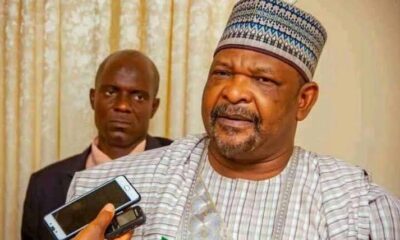President Muhammadu Buhari presented N20.5 trillion budget proposal to a joint session of the National Assembly on Friday.
According to a copy of the budget proposal seen by Investors King, the Federal Government proposed a total expenditure of N20.51 trillion for the 2023 financial year.
This is above the earlier proposal of N19.76 trillion approved in the 2023-2025 Medium Term Expenditure Framework and Fiscal Strategy Paper (MTEF/FSP) submitted to the National Assembly.
The budget which was christened ‘Budget of Fiscal Sustainability and Transition’ is the last annual budget to be presented by President Buhari before the expiration of the present administration.
Some of the parameters and fiscal assumptions captured in the 2023 budget proposal include an oil price benchmark of $70 per barrel, an estimated daily oil production of 1.69 million barrels, an exchange rate of N435.57/$1, a projected Gross Domestic Product (GDP) growth rate of 3.75 percent and an inflation rate 17.16 percent.
Furthermore, revenue parameters as contained in the budget proposal include N16.87 trillion as collectables, while the total revenue available to fund the 2023 Federal Budget is estimated at N9.73 trillion.
The budget proposal has an oil revenue projection of N1.9 trillion and a non-oil tax estimate of N2.43 trillion. Revenue from Government Owned Enterprises is estimated at N2.42 trillion.
In regard to the expenditure, the federal government plans to spend N20.5 trillion in 2023. A statutory transfer of N744.11 billion will be made from the overall expenditure. Personnel cost was estimated at N4.99 trillion, overhead cost will consume N1.11 trillion, pensions, gratuities and retirees’ benefits will take N854.8 billion while a sum of N5.35 trillion will be expended on capital expenditure.
Meanwhile, the federal government has also earmarked N6.31 trillion for debt servicing.
Our correspondent also observed that the 2023 budget proposal has a deficit of N10.78 trillion which represents more than 50 percent of the entire budget.
As expected, the government planned to finance the budget deficit by making new borrowings which will total N8.80 trillion. A sum of N206.18 billion will be sourced from privatisation proceed while N1.77 trillion Naira will be harnessed from bilateral/multilateral loans.
While presenting the budget, the President used the occasion to highlight both the challenges and the achievements of his administration. Some of the achievements which the president highlighted include the construction of the Second Niger Bridge, the Lagos-Ibadan Expressway and the Abuja-Kano Road.
Others include completing and commissioning the 156km Lagos-Ibadan Standard Gauge Rail (and its 8.72km extension to Lagos Port); the 186km Abuja-Kaduna Standard Gauge Rail; and the 327km Itakpe-Warri Standard Gauge Rail.
President Buhari also highlighted his achievements in the aviation industry, mentioning the completion of new Airport Terminals at Lagos, Abuja, Kano and Port Harcourt.
On the other hand, the president disclosed that the adverse impact of Covid 19 pandemic dealt a big blow to the country’s economy. He also mention that unemployment, insecurity and high inflation rates are some of the challenges that his administration tried to address.
Our correspondent learnt that top government officials who accompanied the president to the National Assembly include the Vice President, Prof Yemi Osinbajo, the President’s Chief of Staff, Prof Ibrahim Gambari and virtually all the ministers.


 Naira4 weeks ago
Naira4 weeks ago
 Naira4 weeks ago
Naira4 weeks ago
 Travel3 weeks ago
Travel3 weeks ago
 Jobs4 weeks ago
Jobs4 weeks ago
 Naira3 weeks ago
Naira3 weeks ago
 Naira3 weeks ago
Naira3 weeks ago
 Investment4 weeks ago
Investment4 weeks ago
 Travel4 weeks ago
Travel4 weeks ago



























